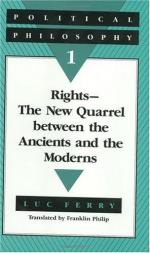|
This section contains 4,175 words (approx. 14 pages at 300 words per page) |

|
SOURCE: “Ancients and Moderns in Defoe's Consolidator,” in SEL: Studies in English Literature 1500-1900 Vol. 28, No. 3, Summer 1988, pp. 391-400.
In the essay below, Shaw interprets Daniel Defoe's Consolidator as a part of the Battle of the Books, judging it “Defoe's first extended contribution to the battle of the ancients and moderns.”
The Consolidator has long been recognized as an allegory pertaining to political events during the period 1660-1705—in particular, to the problems posed by the Spanish succession, and the High Church's move to tack an important land bill onto a bill designed to prevent the occasional conformity of dissenters.1 Less apparent is the fact that the Consolidator represents a substantial contribution on Defoe's part to the ancients-moderns controversy, the only indication of this dimension of the Consolidator being provided by Marjorie Nicolson's brief comments upon the relevance of this work to “the perennial controversy between ‘ancient’ and...
|
This section contains 4,175 words (approx. 14 pages at 300 words per page) |

|


